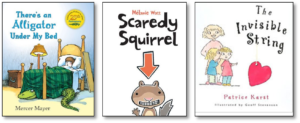Childhood Fears
 Many children have fears. It is a part of healthy child development. Their fears often depend on their age or level of development. For example, babies may begin to fear strangers at around eight months of age, toddlers cry when their parents leave, preschoolers have vivid imaginations and often cannot tell the difference between imaginary and real things like the monster under the bed, and young school children start to fear real things like a fire or getting hurt.
Many children have fears. It is a part of healthy child development. Their fears often depend on their age or level of development. For example, babies may begin to fear strangers at around eight months of age, toddlers cry when their parents leave, preschoolers have vivid imaginations and often cannot tell the difference between imaginary and real things like the monster under the bed, and young school children start to fear real things like a fire or getting hurt.
Here are some things to try that may help your child overcome fear:
- Respect that the fear is real for your child. Never make fun of or dismiss the fear.
- Let babies become familiar with new people. Ask the person to play with the baby at a safe distance. Never force a baby to go with someone.
- Hold your child or give them your hand and reassure them they are safe.
- Try to anticipate fears. If you go to another room, let your child know you are leaving and will talk to them when you return. Explain to your child that you will come back for them.
- Help your child by reading books about their fear, telling stories, and acting out things to help with their fear.
- Encourage your child to take slow, deep breaths to help manage the fear they feel.
- Limit scary things on screens.
- Be patient. Ask questions and listen to your child.
Ask your librarian for books to read with your child, like “There’s an Alligator Under My Bed” by Mercer Mayer, “Scaredy Squirrel” by Mélanie Watt, or “The Invisible String” by Patrice Karst. Visit the NL Public Libraries website to find a library near you.
Are my child’s fears okay, or should I seek professional help?
Your support is often enough to help your child cope with their fears. But sometimes, fears can go a bit out of our control. If this happens, talk to your doctor or nurse practitioner.
For example, call if your child’s fear:
- Seems extreme to you, and you feel you cannot help them.
- Causes them to become very upset or lash out.
- Keeps your child from doing things they usually would like to do.
- Causes them to feel sick, have tummy aches, headaches, dizziness, or a racing heart.
Services related to this information:
- Contact your Public Health Nurse
- 811 HealthLine (Newfoundland & Labrador) – Call 811 or 1-888-709-2929 / TTY 1-888-709-3555


